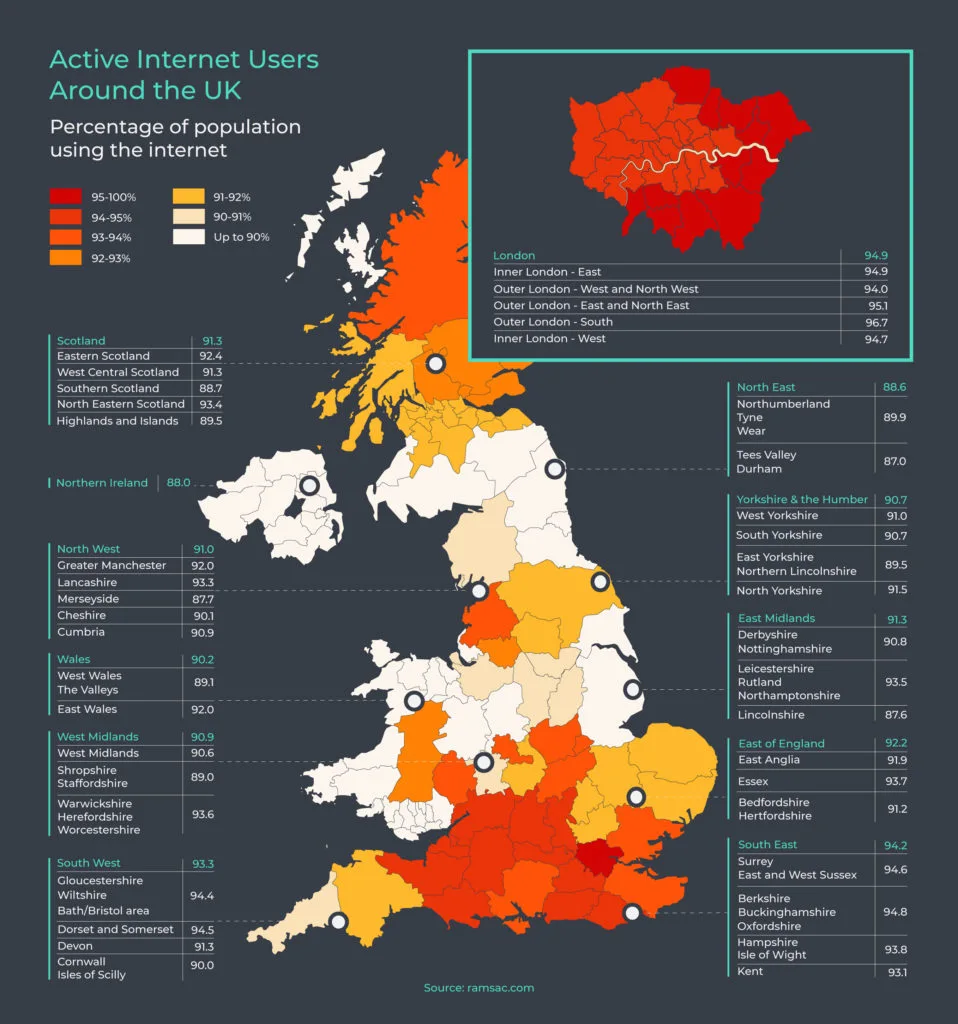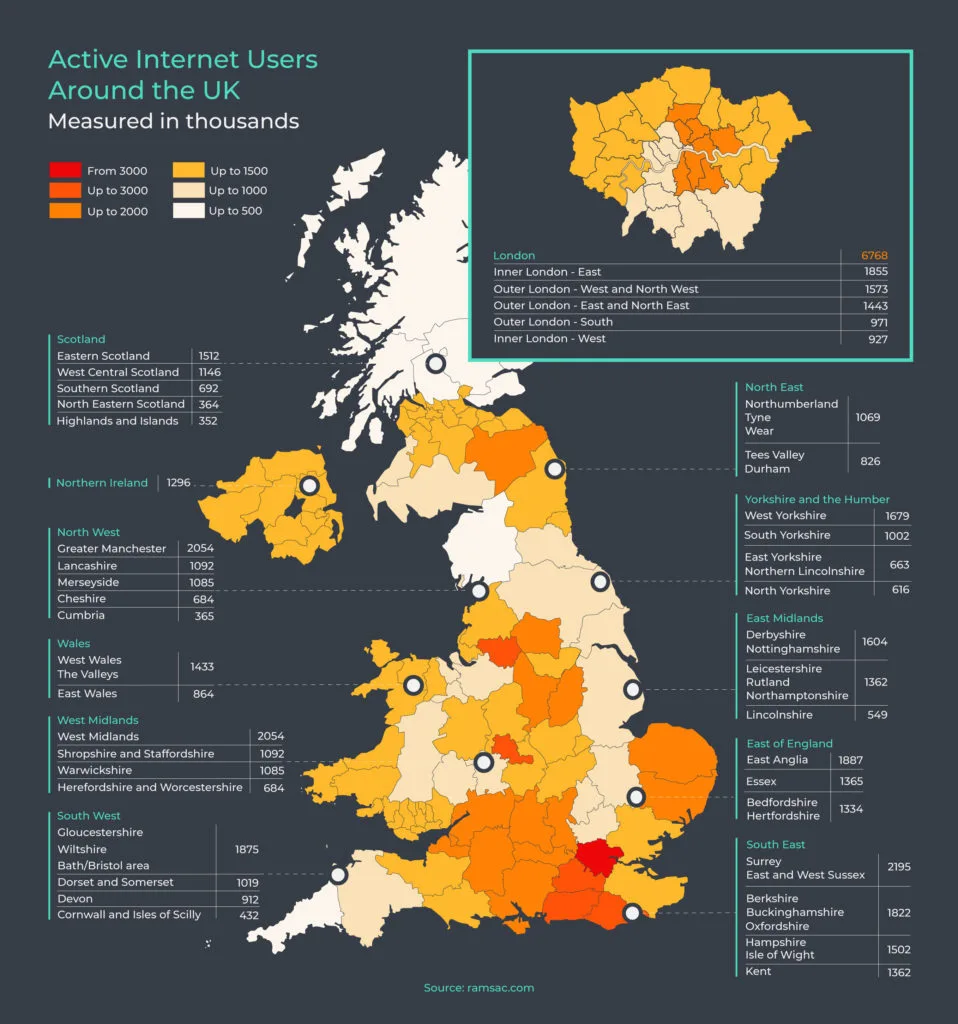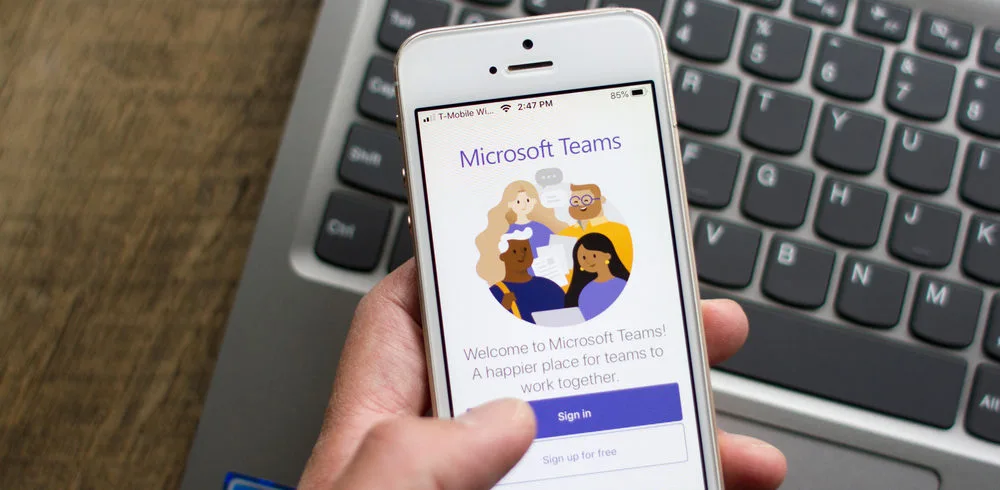Internet users around the UK

Posted on October 22, 2021 by Louise Howland
Using data from the Office for National Statistics, ramsac has discovered how many active internet users are in the UK, and where they are. From Dunstable to Dorset, the nation has been broken down into 174 locations to finally reveal exactly where the internet hotspots are.
Active internet users by percentage of population
When looking at the percentage of the population using the internet, Croydon came out on top, with a huge 99.1% of the population using the internet in a three month period. This was the highest percentage of any location in the UK, with Camden and the City of London coming in second at 98.3%. The area with the lowest percentage was Luton, with 77.8% of the population using the internet.
Despite Luton coming out lowest in the analysis, the East of England (the region Luton was included in) was not the location with the lowest percentage of internet users in England. Instead it was the North East, with a total percentage of 88.6%, compared to 92.2% in the East of England.
The Scottish Borders – a location with only 88,000 users – was the 5th highest location for percentage of users in the nation at 97.6%, beating major cities all over the UK including Swansea (94.7%), Portsmouth (96.5%), and Oxfordshire (96.5%).
Looking at the UK as a whole, 92.1% of the country were active internet users, with 7.8% having either never used the internet, or not used it within a three month period.

- London/Croydon: 94.9%/99.1%
- South East/Brighton and Hove: 94.2%/97.7%
- South West/Torbay: 93.3%/96.3%
- East of England/Heart of Essex: 92.2%/97.3%
- Wales (Joint 5th)/Swansea: 91.3%/94.7%
- Scotland (Joint 5th)/Scottish Borders: 91.3%/97.6%
- North West/Chorley and West Lancashire: 91%/97.9%
- West Midlands/Coventry: 90.9%/96.8%
- Yorkshire and the Humber/Wakefield: 90.7%/94.8%
- Wales/Monmouthshire and Newport: 90.2%/95.8%
- North East/Darlington: 88.6%/92.1%
- Northern Ireland/Antrim and Newtownabbey: 88%/94.5%
Active internet users by number of users
The South East took the number one spot for sheer quantity of users, officially earning the title of the internet capital of the UK. A total of 6.88 million users were in the South East, and only London comes close to the South East’s figure at 6.77 million. In the South East, Berkshire was the county with most users, sitting at 667,000 users, with the least amount of users being off the mainland in the Isle of Wight, at 107,000 users.
The hot spot in London was Lewisham and Southwark, with 492,000 users, and followed by Hackney and Newham with 475,000 users. Both of these figures are well above the UK average for internet users per location, which sat at 282,000. Moving away from London, Cheshire East was the most ‘average’ location in the UK, with 284,000 users.
When analysing the data on a less granular scale, Surrey and Sussex still dominated with 2,195,000 users; more than the entirety of Northern Ireland or the North East.

Across the UK, there were over 49 million active internet users. Here’s how each region of the nation compared:
- South East: 6,881,000
- London: 6,768,000
- North West: 5,280,000
- East of England: 4,586,000
- West Midlands: 4,256,000
- South West: 4,238,000
- Scotland: 4,068,000
- Yorkshire and the Humber: 3,960,000
- East Midlands: 3,514,000
- Wales: 2,298,000
- North East: 1,896,000
- Northern Ireland: 1,296,000
At 1.3 million users, Northern Ireland was equal to 18.8% of the users in the South East. The region with the least users in Northern Ireland was Fermanagh and Omagh, with only 81,000 users; the third lowest region in the whole of the UK. The Isle of Anglesey took the award for least internet users, at just 54,000.
Age groups using the internet
Looking at the age of internet users around the UK, women were the dominant users of the internet, with 24,758,000 users, compared to 24,283,000 men. However, when broken down by age group, 25 – 34 year old men used the internet the most, with 4,479,000 users. 45 – 54 year old women took second place, with 4,453,000 users. Both men and women aged 75+ used the internet the least, and a combined 2,108,000 men and women in the age group said they had never used the internet.
UK vs the world
Data from Statista showed that there are 4.66 billion active internet users around the world, meaning the UK makes up only 1.05% of the global active internet users. This also equates to 59.5% of the global population. The data also stated that 92.6% (or 4.32 billion) accessed the internet through mobile devices.
Data and methodology
Data for this study was acquired from the latest data published by the Office for National Statistics (ONS), and can be explored here. Unless stated otherwise, the data used in the article looks at active internet users, which means they had to have used the internet in a three month period to be considered active.







